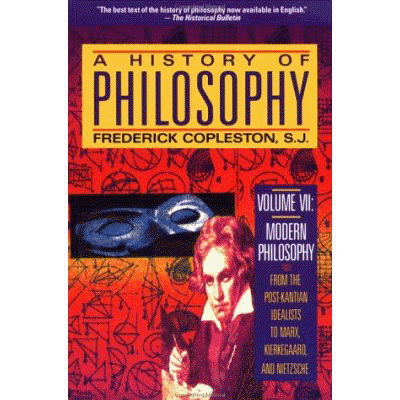|
A History of Philosophy by Frederick Copleston, S.J. Reviewed by Josh Hickok |
|
|
Frederick Copleston was an Oxford Jesuit, who, concerned with the quality of philosophy textbooks, endeavored to write a nine volume classic on developments, definitions and figures of philosophy. He starts with the pre-Socratics, such as Thales, and ends with the contemporaries (relative to his time period) like Sartre and other existentialists. In my opinion, there has never been such an accurate presentation of past thinkers available to the layman.
Especially impressive is his work on the medieval writers. Being a Catholic, Copleston possesses an amazing insight in the area of Thomas Aquinas. Here you see the greatest Aristotelian at work in communicable (in time) language. He considers himself a Thomist, and as such delivers a solid piece. If you are interested in Aquinas or other Scholastics, this volume (II) is a definite must-read.
Though the language teeters slightly on the technical side when reading the enlightenment writers and German philosophers, you should be able to work yourself through this book with a medium understanding of philosophical verbiage. On a scale of 1 to 10, I would give this an 8.
Strengths
-
Very thorough
-
Polite and nearly unbiased
-
Good, even pace
Weaknesses
-
Pretty technical at some times
-
Since Copleston was a Catholic we disagree with many of his doctrinal positions
-
Doesn’t touch a whole lot on how evolution influenced modern philosophy
|
Rating: (8 out of 10) About the Author (from back cover) Copleston, an Oxford Jesuit of immense erudition who once tangled with A.J. Ayer in a fabled debate about the existence of God and the possibility of metaphysics, knew that seminary students were fed a woefully inadequate diet of theses and proofs, and that their familiarity with most of history's great thinkers was reduced to simplistic caricatures. Copleston set out to redress the wrong by writing a complete history of Western Philosophy, one crackling with incident and intellectual excitement - and one that gives full place to each thinker, presenting his thought in a beautifully rounded manner and showing his links to those who went before and to those who came after him. |
